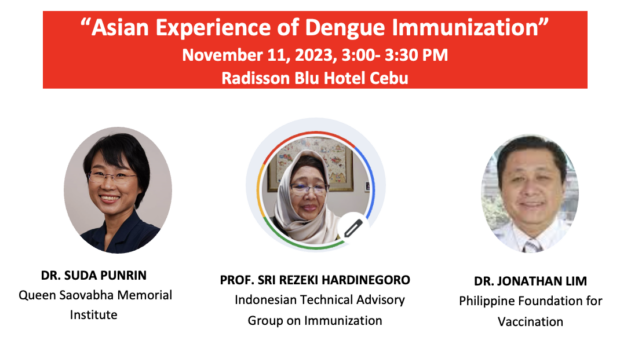Towards achieving zero-dengue deaths
Vaccines are widely recognized as essential public health interventions that prevent various infectious diseases. To underscore the importance of disseminative vital knowledge in the ongoing battle against vaccine-preventable illnesses, and in navigating the aftermath of the COVID-19 pandemic, the annual Philippine National Immunization Conference (24th PNIC) was held in Cebu City. With the theme “The Big Catch Up: Closing in, Renewing the Vaxx-P.A.C.T.”, the last day of the weeklong conference brought together healthcare professionals, policymakers, and various medical organizations to delve into crucial aspects such as vaccine efficacy, safety, effectiveness, and implications within the Asian context.
Elevating dengue as a national health issue
Dengue, considered as endemic in the Philippines, was among the key discussions in this medical convention. In the dengue surveillance report from the Department of Health (DOH), there have been 155,823 cases and 575 deaths recorded in the country as of October 28, 20231.
Pediatric infectious disease specialist Dr. Jonathan G. Lim highlighted the importance of having an integrated multi-pronged response in the prevention and control of dengue infection. He said, “It is well-established that when dealing with dengue, the available treatment is largely supportive, as there are no specific antibiotics or clear medications for the condition. Prevention is deemed a crucial strategy in addressing dengue [and] immunization emerges as a key preventive measure.”
Indonesia’s response to the prevalence of dengue
In Indonesia, the dengue burden remains high with increasing impact over the years despite the existing vector control strategy. Dr. Sri Rezeki S. Hadinegoro of the Indonesian Technical Advisory Group on Immunization (ITAGI) emphasized the 6 pillars of the National Strategy for Innovative Dengue Prevention. This includes leveraging the latest technology to propel the inventions, innovation, and research on the dengue program.
Dr. Hadinegoro also cited the important role of vaccination in reducing the incidence of dengue and dengue-related hospitalizations. Two vaccines are presently available in Indonesia and are indicated for use in eligible individuals 6 to 45 years old. The vaccines been recommended for use by different medical societies including the Indonesian Pediatric Society and the Indonesia Society of Internal Medicine.
Dr. Hadinegoro highlighted the importance of multi-sectoral collaboration in fighting dengue. Support from the Ministry of Health, different universities, NGOs, and the Indonesian Parliament strengthened community engagement through disease awareness initiatives on traditional media channels, professional collaborations, and social media platforms. “It is crucial to emphasize preventive measures by controlling mosquitoes. Strategically, the vaccine should be administered as part of a well-designed community strategy and community engagement for effective completion,” she concluded.
Fighting dengue in Thailand
In Thailand, Dr. Suda Punrin of Queen Saobvha Memorial Institute and Thai Red Cross, shared the dengue burden in their country where 123,000 cases as of October 2023 were reported. The age distribution of cases reveals that dengue predominantly impacts the 5-14 age group, followed by the elderly population. This demographic shift underscores the need for a comprehensive approach to addressing dengue. The Ministry of Public Health of Thailand anchors its surveillance efforts and targeted prevention on three key measures: collection, prevention, and disease control. This includes covering water storage containers, proper garbage disposal, and environmental improvements.
While vaccination is recognized as an important preventive measure against this disease, the dengue immunization journey in the country previously faced a decline in participation due to the pre-vaccination screening requirement. The laboratory procedure prior to vaccine administration entails additional steps and spending from the patients. With the second-generation dengue vaccines indicated for use among individuals regardless of dengue exposure history, Dr. Punrin shared her optimism that this will improve the access to dengue vaccine.
Dr. Punrin concluded that vaccination rollout should be anchored on a well-designed disease awareness and patient education program, emphasizing the importance of ongoing preventive and vector-control measures.
Global perspective on dengue vaccination
The World Health Organization is targeting zero deaths from dengue as part of its 2021-2030 Sustainable Development Goals. The WHO recognizes that vaccination is a critical intervention in the prevention and control of infectious diseases. It also cited that a safe, effective and affordable dengue vaccine against the four strains of the dengue virus would represent a major advance for the control of dengue especially in endemic countries.
Disease awareness, community engagement and a well-designed communication strategy are important pillars in the implementation of public health programs. Until vaccination against dengue is implemented in the Philippines, the experiences from ASEAN neighbors Indonesia and Thailand provide valuable learnings in further strengthening the dengue program in the country.
ADVT.
